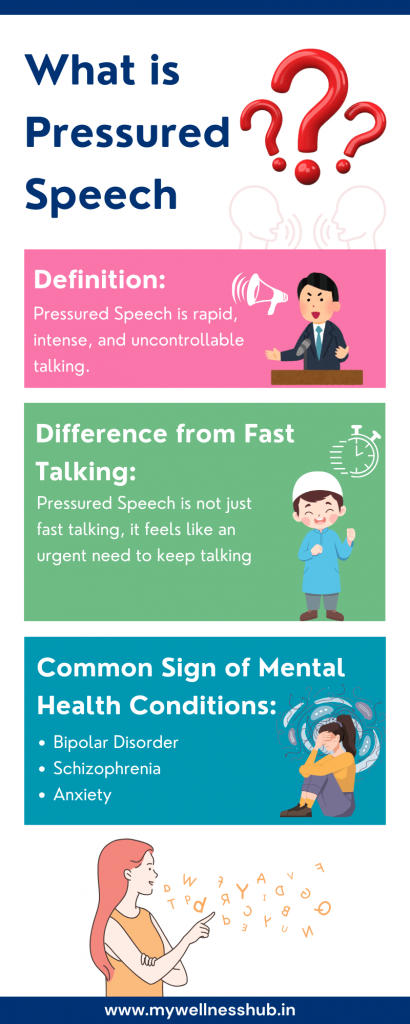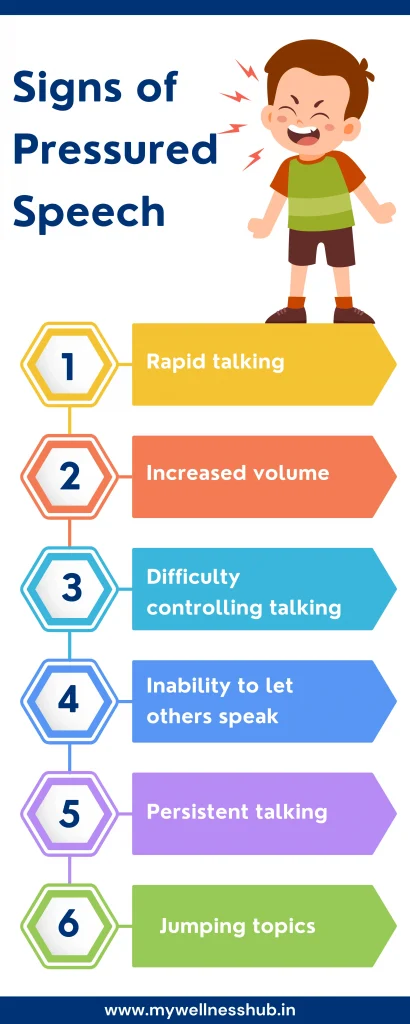Pressured Speech: Signs, Causes, and How to Treat It
By Rajini D
Last Updated: August 1, 2024
In the bustling rhythm of life, we often speak quickly, especially when we’re excited or eager to share our thoughts. But could there be more to it than enthusiasm alone? Imagine feeling compelled to talk at a rapid pace, unable to pause or slow down, as if an unstoppable force drives your words forward. This phenomenon, known as pressured speech, goes beyond simple fast talking.
Understanding is crucial, not just for individuals experiencing it, but also for their loved ones and those who seek to support them. It’s more than just a symptom; it’s a sign that something deeper may be at play. At Wellness Hub, we believe in empowering individuals with knowledge to navigate their mental health journey with confidence and understanding.
This can be a telling indicator of underlying conditions such as bipolar disorder or schizophrenia. Recognizing its signs and understanding its implications can pave the way for early intervention and appropriate treatment. By shedding light on this often misunderstood aspect of communication, we aim to provide clarity and support to our readers.

What is Pressured Speech?
Pressured speech is more than just talking quickly; it’s when people feel an overwhelming urge to speak rapidly, often without natural conversational pauses. Individuals feel compelled to express their thoughts non-stop. Unlike naturally fast talking, which may result from excitement or enthusiasm, this stems from an internal need that’s difficult to control.
Signs of pressured speech
Recognizing this involves understanding its key symptoms, which can manifest in various ways.

Individuals experiencing pressured speech may exhibit the following signs:
- Rapid Speech:
- They speak at an accelerated pace, with words flowing quickly and continuously.
- Increased Volume:
- Their speech may be louder than usual, reflecting the urgency and intensity of their thoughts.
- Difficulty Controlling Talking:
- They may struggle to control the speed and volume of their speech, feeling compelled to keep talking without pause.
- Inability to Let Others Speak:
- Individuals with pressured speech may dominate conversations, making it challenging for others to interject or contribute.
- Persistent Talking:
- Even when others are not actively engaging or paying attention, they may continue talking unabated.
- Resistance to Interruption:
- Attempts to interrupt or change the conversation may be met with resistance, as people with pressured speech feel driven to express their thoughts without being interrupted.
- Unrelated Topics:
- They may jump from one topic to another rapidly, making it difficult for listeners to follow the thread of conversation.
- Impulsivity:
- Pressured speech may be accompanied by impulsive and inappropriate comments, reflecting the individual’s inability to filter or control their speech.
Recognizing these symptoms is essential in identifying and understanding its potential implications for mental health. By raising awareness of these signs, Wellness Hub aims to empower individuals to recognize in themselves or others and seek appropriate support and intervention.
Also Read: Is My Child Talking Late? Expressive vs. Receptive Delays
Causes of pressured speech
The causes of can vary, but they often stem from underlying mental health conditions or external factors that affect communication. Understanding these causes is essential in addressing the root of the issue and providing appropriate support and treatment.
Here are some common factors
1. Bipolar Disorder and Schizoaffective Disorder:
It is frequently observed in individuals experiencing manic or hypomanic episodes associated with bipolar disorder or schizoaffective disorder. During these episodes, heightened energy levels and changes in mood can contribute to a rapid and relentless stream of speech.
2. Other Mental Health Conditions:
It may also occur in conjunction with other mental health disorders, such as schizophrenia, autism, and anxiety disorders. These conditions can impact cognitive function and communication skills, leading to difficulties in regulating speech patterns.
3. External Factors:
Stressful situations, environmental triggers, or traumatic experiences can exacerbate pressured speech symptoms. Individuals may feel compelled to talk quickly or incessantly as a coping mechanism or as a response to heightened emotional arousal.
4. Possible Connection with Illegal Drugs:
The use of certain illegal drugs, such as cocaine or amphetamines, may induce symptoms of pressured speech. These substances can alter brain chemistry and neurotransmitter activity, leading to erratic speech patterns and impulsivity.
Read more: Unlocking Communication: Effective Speech Therapy for Autism
Comparison of Manic and Hypomanic Episodes
| Feature | Manic Episode | Hypomanic Episode |
|---|---|---|
| Severity | Severe | Milder |
| Duration | More than 1 week | About 4 days |
| Impact on Functioning | Significant impact on daily functioning, often leading to impairment in social or occupational settings | Less significant impact, usually allowing normal functioning |
| Symptoms | Extremely high energy, pressured speech, decreased need for sleep, grandiosity, risky behavior, racing thoughts | Increased energy, pressured speech, decreased need for sleep, racing thoughts |
| Intervention | Often requires hospitalization, especially if behavior becomes harmful | Usually managed with outpatient care, as symptoms are less severe |
Know more: Helping Your Child Overcome Stuttering: A Guide for Parents
How to Treat Pressured Speech
Overview of Treatment Options
Effective management typically involves a combination of medication and therapy. By targeting both the biological and psychological aspects of the condition, individuals can gain better control over their speech patterns and improve their overall well-being.
Medications
Medications play a crucial role, especially when it’s linked to mental health conditions like bipolar disorder or schizophrenia. Here are some commonly prescribed medications:
- Antipsychotics: These medications help regulate neurotransmitter activity in the brain, reducing symptoms of mania or psychosis associated with pressured speech.
- Antidepressants: Certain antidepressants may be prescribed to stabilize mood and alleviate symptoms of depression, which can contribute to pressured speech.
- Anti-anxiety Medications: These medications can help alleviate feelings of anxiety or agitation, which may exacerbate pressured speech symptoms.
Therapy
Role of Cognitive Behavioral Therapy (CBT)
Cognitive-behavioral therapy is a widely used therapeutic approach that can be effective in addressing the underlying thought patterns and behaviors associated with pressured speech. Through CBT, individuals can learn coping strategies, develop effective communication skills, and gain insight into their thought processes.
Wellness Hub Support:
At Wellness Hub, we understand the importance of holistic mental health support. Our experienced therapists offer personalized therapy sessions to help individuals manage and improve their overall well-being. Through compassionate guidance and evidence-based interventions, we empower individuals to overcome communication challenges and thrive in their daily lives.
Conclusion
In closing, understanding pressured speech is crucial. It’s more than just talking fast – it’s about knowing the reasons behind it. By recognizing its signs and causes, we can take steps to get help. Throughout this article, we’ve looked at how it can be linked to different conditions. From bipolar disorder to schizophrenia, there’s a lot to consider. But remember, seeking support is important. Whether it’s from professionals like those at Wellness Hub or from loved ones, there’s help available.
So, don’t feel alone in dealing with pressured speech. You’re not weak for experiencing it – it’s a symptom that deserves understanding. Reach out for support, and together, we can work towards better communication and mental well-being. At Wellness Hub, we’re here to offer personalized guidance and care. Let’s take this journey together towards a brighter future.
Frequently Asked Questions:
1. What is Pressured Speech?
The symptom are characterized by rapid, intense, and urgent talking. Unlike regular fast talking, it often indicates an underlying issue such as a mental health condition. Understanding helps identify when it’s time to seek professional support.
2. What Are the Symptoms ?
The symptoms include talking rapidly without pauses, difficulty being interrupted, and changing topics frequently. These signs can indicate underlying conditions like bipolar disorder or anxiety, and seeking help is important.
3. What Causes Pressured Speech?
Pressured speech can be caused by mental health conditions like bipolar disorder, schizoaffective disorder, and schizophrenia. It can also result from anxiety, autism, or drug use. Identifying the cause is crucial for appropriate treatment.
4. How Can Pressured Speech Be Treated?
It is treated through medications like antipsychotics, antidepressants, or anti-anxiety meds, and therapies such as cognitive behavioral therapy. Seeking help from professionals, like those at Wellness Hub, is a great step towards managing this symptom.
5. How Can I Deal with Pressured Speech?
Dealing with pressured speech involves understanding its cause and seeking appropriate treatment. Therapy, relaxation techniques, and medication can all help. Consulting experts, such as those at Wellness Hub, can guide you towards effective solutions.
6. How Long Does Pressured Speech Last?
The duration of pressured speech varies, often lasting from minutes to hours during manic or hypomanic episodes. The key is to seek professional help, especially if the symptom persists or worsens.
7. Is Pressured Speech Dangerous?
Pressured speech is not typically dangerous on its own, but it can signal underlying issues like bipolar disorder or anxiety. Addressing these conditions is crucial for overall well-being, so it’s important to consult a healthcare professional.
8. Can Pressured Speech Be Cured?
Pressured Speech can be managed and significantly improved with treatment. Medications, therapy, and lifestyle changes can help reduce symptoms. Seeking help from professionals, like those at Wellness Hub, can be very effective.
9. Is Pressured Speech a Mental Illness?
Pressured speech is not a standalone mental illness but a symptom of conditions like bipolar disorder or schizophrenia. Identifying and treating the underlying condition is important, which can be done with the help of mental health professionals.
10. Can Pressured Speech Be Prevented?
Preventing pressured speech involves managing underlying mental health conditions and reducing stress. Regular therapy, proper medication, and healthy lifestyle choices can help prevent episodes. Seeking professional guidance is a proactive step.
About the Author:
Rajini Darugupally
M.Sc., Speech-Language Pathologist (9+ years of experience)
Rajini is a passionate and dedicated Speech-Language Pathologist with over 9+ years of experience, specializing in both developmental speech and language disorders in children and rehabilitation in adults. Driven by a desire to empower each individual to find their voice, Rajini brings a wealth of experience and a warm, genuine approach to therapy. Currently, at Wellness Hub, she thrives in a team environment that values innovation, compassion, and achieving results for their clients.
Book your Free Consultation Today
Parent/Caregiver Info:
Client’s Details:
* Error Message








